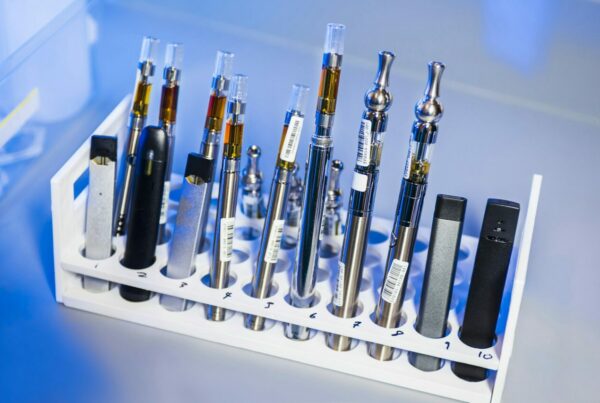N, N-Dimethyltryptamine (DMT) is a substance commonly found in both plants and animals, known for its intense yet fleeting psychedelic effects when ingested.
Emerging evidence suggests that DMT, which naturally exists in the body, plays crucial roles in both the peripheral and central nervous systems and might act as a neurotransmitter.
DMT can trigger strong psychedelic experiences, but it usually doesn’t cause many negative effects, apart from potential cardiovascular problems when administered in large doses through injection.
Let’s explore DMT and its diverse roles. These roles range from recreational use to its intriguing potential in scientific research and therapeutic uses.

DMT at a Glance: What is it?
| Aspect | Description |
| Name | N, N-Dimethyltryptamine (DMT) |
| Classification | Indole alkaloid |
| Occurrence | Occurs naturally in a variety of plants and animals |
| Psychoactive Effects | Causes brief, intense psychedelic experiences when ingested. |
| Method of Consumption | Can be smoked, injected, or taken orally. |
| Duration of Effects | Effects are short-lived, typically lasting from 5 to 30 minutes. |
| Chemical Structure | Composed of a tryptamine core with two methyl groups attached to the amine nitrogen atom. |
| Metabolism | Rapidly metabolized by the body, broken down by monoamine oxidase (MAO). |
| Cultural Use | Used historically in various ceremonial and shamanic rituals by indigenous cultures. |
| Other names | Dimitri, fantasia, businessman’s trip, Businessman’s special, 45-minute psychosis, spiritual molecule |
The Role of DMT in Mental Health
N, N-Dimethyltryptamine (DMT), a substance known for its potent psychedelic effects, is garnering attention for its potential impact on mental health. While traditionally known for inducing powerful visionary experiences, recent studies suggest a connection between DMT and mental wellness.
Effects on Psychological and Emotional Well-being
DMT is known for its powerful psychedelic effects, which can cause intense emotional reactions and alter states of consciousness. These transformative experiences could potentially pave the way for innovative mental health therapies, assist in processing emotions, and provide new insights into personal traumas.
Neuroplasticity and Brain Function
Research suggests that DMT could influence neuroplasticity, thereby enhancing the brain’s ability to adapt and reorganize. Investigating its impact on synaptic plasticity and neural connectivity could provide potential treatment options for conditions associated with neural dysregulation.
Potential Therapeutic Use for Mental Health Disorders
Initial studies indicate that DMT could be useful in treating mental health disorders such as depression, addiction, and PTSD. Its ability to induce mystical or spiritual experiences may offer a novel approach to psychotherapy, aiding in the transformation of negative thought patterns.
The natural presence of DMT within the human body is believed to play a crucial role in mental health resilience, stress management, and overall psychological well-being. Understanding how the body maintains internal DMT levels could lead to the development of innovative therapeutic strategies.
DMT and Mental Health Disorders
| Mental Health Disorder | Description | Potential Effectiveness of DMT | Benefits |
| Depression | A mood disorder characterised by persistent sadness, a lack of interest, and decreased motivation | Initial research suggests that DMT may help relieve symptoms by provoking deeply emotional experiences. | Its rapid onset and ability to induce transformative experiences may offer innovative therapeutic approaches for reorienting negative thought patterns and enhancing emotional processing |
| Post-Traumatic Stress Disorder (PTSD) | A mental health disorder triggered by traumatic events, leading to flashbacks, severe anxiety, and intrusive thoughts | Preliminary research points to DMT’s potential to manage symptoms by inducing spiritual or mystical experiences that could help patients reframe traumatic memories | DMT’s ability to induce altered states of consciousness may assist in facilitating emotional processing and providing a fresh perspective on traumatic experiences |
| Addiction | A complex disorder characterised by compulsive engagement in rewarding stimuli despite adverse consequences | Some studies suggest that DMT might disrupt addictive patterns and lessen cravings for substances | DMT’s potential to induce powerful and transformative experiences might help individuals modify their behavioural patterns and address their issues with substance abuse |
Approaches to DMT Usage
DMT, renowned for triggering short, yet potent, psychedelic experiences, can be administered in various ways. The chosen method often hinges on the desired intensity and duration of the experience.
Smoking:
DMT, when smoked in a pipe or vaporized, necessitates meticulous temperature control to avoid overheating and burning the substance. The psychedelic experience is nearly instantaneous upon smoking DMT, typically persisting for about 5 to 15 minutes.
Oral Intake:
Consuming DMT orally triggers slower onset effects that last considerably longer, often several hours. This is due to the slower metabolism of DMT when mixed with an MAOI.
Injection:
DMT can be injected directly into the bloodstream for quick and potent effects.
This approach results in an immediate and intense experience, but it necessitates precise dosage measurement and carries increased risks.
Insufflation (Snorting):
Snorting DMT results in a slower onset of effects compared to smoking but may provide a more extended experience.
Sublingual or Buccal Administration:
When absorbed through the oral mucosa, this technique offers an alternative to smoking and delivers a longer, though less intense, experience.
Determining Therapeutic Dosage for N, N-Dimethyltryptamine (DMT)
For smoking, the suggested dosage ranges from 20 to 40 mg, whereas for intravenous administration, the recommended dosage is 0.2 to 0.4 mg per kg of body weight. These dosage guidelines are primarily applicable to clinical research and are especially pertinent for intravenous administration.
- Higher dosages administered intravenously are associated with intense visuals, temporary loss of control, and a combined state of anxiety and euphoria
- Interestingly, lower dosages have exhibited less favorable effects
- Recreational dosages of smoked DMT generally vary from 40 to 50 mg, occasionally even reaching up to 100 mg
- Different dosages of intravenous Individuals who have experienced near-death phenomena during use of DMT (7, 14, 18, and 20 mg solutions) report enduring and positive enhancements to their psychological health.
Access to DMT
ProductsOsmosis – 4-ACO-DMT Ethereal Essence Tincture
This tincture is marketed as containing 4-Acetoxy-N, N-dimethyltryptamine (4-AcO-DMT), a version of DMT. Tinctures are liquid extracts designed for ingestion, and this specific product may offer a unique experience compared to conventional DMT.
Lucid Supply Co. – 5-MeO DMT Vaporizer
This product is a vaporizer that delivers 5-Methoxy-N, N-dimethyltryptamine (5-MeO-DMT). 5-MeO-DMT, the active ingredient, is famed for its potent, transformative, and often ephemeral experiences.
Integral Alchemist – Acacia – 1ml DMT Vape Cartridge
This DMT vape cartridge by Integral Alchemist is pre-loaded with N, N-Dimethyltryptamine, ideally suiting those who favor a discreet and convenient method of DMT consumption.
Deadhead Chemist – 5-Meo-DMT Cartridge
This cartridge houses 5-Methoxy-N, N-dimethyltryptamine (5-MeO-DMT), a substance known for its deep and intense effects.
The potential mental health benefits could be tied to personal growth, spiritual experiences, and therapeutic applications aimed at enhancing emotional well-being.
Deadhead Chemist – N, N DMT Cartridge
Another offering from Deadhead Chemist, this cartridge is filled with the traditional N, N-Dimethyltryptamine. Cartridges provide an effortless way of DMT administration, promising a more consistent and controlled experience.
Closing Remarks
The consumption of N, N-Dimethyltryptamine (DMT) in
How does DMT compare to traditional methods of mental health therapy?
Mental health therapy is a complex and thrilling journey. The ability of DMT to induce potent yet ephemeral psychedelic experiences opens the door to innovative treatment approaches.
Early studies point towards its possible role in emotional regulation, self-improvement, and perhaps
The profound implications of mental health treatment necessitate careful evaluation and responsible application.
For individuals keen on responsibly exploring DMT products, reliable sources like the Mushroom Canada Online Dispensary are available to provide advice and a variety of options.
Frequently Asked Questions:
How do different DMT products affect mental health?
For instance, vaporizers might have immediate effects, but tinctures or vape cartridges can provide more controllable and steady doses.
Incorporating derivative compounds or 5-MeO-DMT can lead to varying levels of intensity and distinct mental health effects.
These nuanced differences underline the importance of selecting a DMT product based on individual preferences and mental health goals.
Does DMT have long-term effects on mental health and personal growth?
There are anecdotal accounts suggesting that DMT-induced experiences could have enduring effects on mental health and self-development.
Profound or transformational experiences, such as those resembling near-death incidents, are frequently associated with claims of ongoing positive changes in psychological wellbeing and personal development.
Although these experiences are powerful and short-lived, they often lead to introspection, spiritual revelations, and a sense of unity or enlightenment.
Users commonly report a refreshed perspective on life, improved emotional resilience, and an enhanced appreciation for life following these experiences.
What is the optimal approach to using DMT for mental health purposes?
It is essential to make informed decisions, which involves thorough research and comprehension of the compound’s effects.
Advice from mental health professionals or seasoned users can provide valuable perspectives on potential risks and advantages.
Understanding one’s personal tolerance and mental preparedness is also critical, as is ensuring a supportive and secure environment for the experience.
How does DMT stand in comparison to other psychedelic therapies like psilocybin or LSD in the context of mental health treatment?
DMT’s effects, duration, and potency vary from other psychedelics such as psilocybin or LSD. It has a notably brief duration.
The profound experiences induced by these short-acting but highly potent psychedelics call for particular therapeutic methods in mental health care, which are different from those employed for longer-lasting psychedelics.
Recommended Additional Reading:





